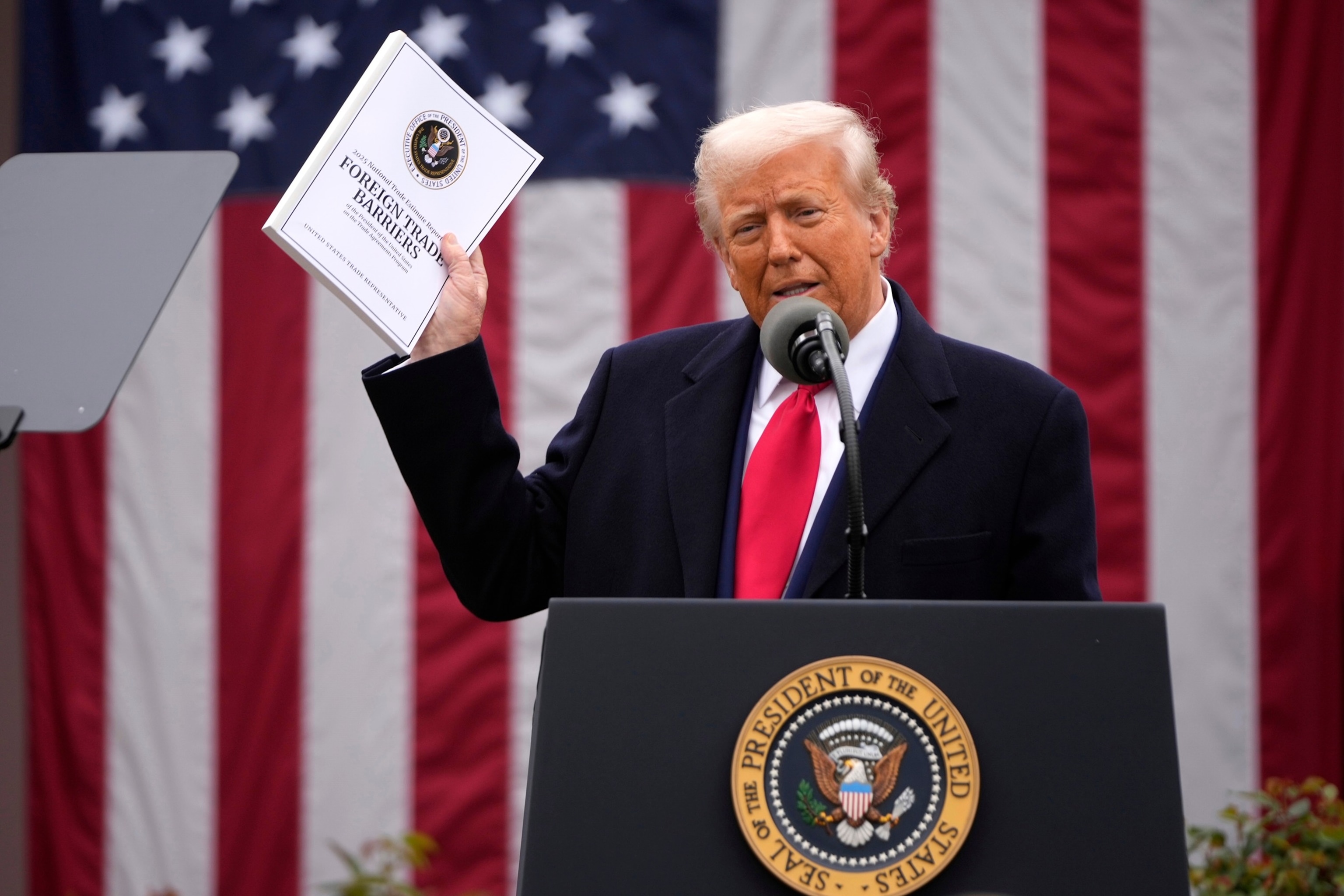Wendy Brugh, owner of the dry ridge farm at Marshall, North Carolina, said the announcement of President Donald Trump’s tariff such as “Pouring salt into the wound that had just begun to heal.”
During a small business owner meeting on Wednesday, he said the tariff would increase the cost “everything ranging from fertilizer and feeding to construction materials and tractors,” hitting the agricultural community while still recovering from the loss of plants after the Helene storm.
“We are personally confronted with uncertainty about how the rate of retaliation will affect our biggest cost, our livestock feed,” Brugh told ABC News’ ASHEVILLE WLOS affiliation.

President Donald Trump spoke during the event to announce a new tariff at the Rose Garden at the White House, April 2, 2025, in Washington, DC
Mark Schiefelbein/AP
Brugh and other small business owners weigh the tariffs launched by Trump on almost all US trading partners on Wednesday afternoon. He described the tariff as a “reciprocal type” and will focus on the countries he claims are the worst violators in trade relations with the US
New steps – described by Trump as “historic” – including a minimum basic line rate of 10% in all trading partners and further, more targeted penalties in certain countries, including China, European Union and Taiwan.
“We will collect them about half of what they are and have collected us,” he said, added, “Because we are very good.”
Hendrick Svendsen, owner of a furniture shop in Merriam, Kansas, told ABC News on Wednesday that he had decided to close his shop because of the announcement of Trump’s tariff.
“We have just made a decision that we will close, we will come out in August,” Svendsen said.
He said there was no way to continue shop operations using American products, with 90% of their items made abroad.
“I don’t think that furniture manufacturing will return to US North Carolina, where it was made, it was like a ghost city,” Svendsen said at ABC News Live. “When coming to skills and workers, I don’t think we have it in the US”
Furniture manufacturing work in the United States has declined over the past few months, with 336,900 reported in February, according to US Manpower Statistics Bureau.

Trade Secretary Howard Lutnick holds a graph when President Donald Trump spoke during the event to announce a new tariff at the Rose Garden at the White House, April 2, 2025, in Washingto, DC
Mark Schiefelbein/AP
Simon Bryant, a restaurant owner in San Francisco, told ABC Station KGO That food costs are difficult to manage because of bird flu, and tariffs can make things more challenging.
“The reality is that everyone pays a higher price,” Bryant said. “We must find out what to do as a community.”
But, there are people who are optimistic about tariffs, including Duane Paddock, owner of Chevrolet dealers in Buffalo, New York. He told ABC News Live that he had seen the best sales in 13 years.
While he was not sure of the exact impact of the tariff, he said he hoped that Trump’s announcement was “the best thing for our country” and that the dealer would continue to “maintain the lowest possible price and do a fair part to help customers.”
“Whether President Trump is a Democrats or Republican, I must have confidence in my President and that is what I chose,” Paddock said.
He also stressed the importance of this tariff that allows products to be made in the United States.
“This is a great opportunity for people to return with manufacturing and have the opportunity to have a great middle class life and increase their compensation during the trip,” Paddock said.
James Evans, a manufacturer that produces a car part in the US, gave Baltimore ABC Affiliate Wmar The tariff will be “good for us in six months to one year.”
“I think in three, four years, it must make us and other people who produce here in America for success,” Evans said. “I’m fine by dealing with some headaches for the next six months to one year and hopefully everything goes like I think they will leave and then we will be fine, but maybe not. Only time will tell.”
In South Carolina, shrimp catcher is also happy with the announcement of Trump tariffs. Rocky Magwood told Charleston ABC WCIV affiliation that he would now be able to “sell everything” he captured. According to Southern Shrimp Alliance94% of shrimp consumed in the United States are imported, with India and Ecuador supplies almost 70%.
“This is the biggest thing we see,” Magwood said. “Maybe people will want to buy more shrimp. I can’t say about politics in one way or another because I am not into politics. That’s not what feeds my family.”
But Leah Ashburn, President and CEO of Highland Brewing in North Carolina, said that moving to American production was not feasible in all industries, especially the company, which depends on aluminum to make beer cans. While there are aluminum producers in the United States, Canada is still a fourth largest main aluminum provider, behind China, India and Russia, according to him Canadian government.
In 2021, the United States contributed less than 2% of the global aluminum production, according to A Congress research service report.
“The US cannot spin to make aluminum cans,” Ashburn told Wlos. “Mining is not done here. 95% aluminum is brought from other countries, and we depend on Canada. Efforts to make aluminum here will be complicated, expensive and require a lot of time. It won’t come soon.”
He also said his business could not increase prices because consumers had “reached their limits about what they would pay for six packages.”
The 10% baseline tariff level came into force on April 5, according to senior White House officials. The “reciprocal type” rate starts from 9 April at 12:01 am, said officials, and will affect around 60 countries.
ABC News’ Jaclyn Lee.


